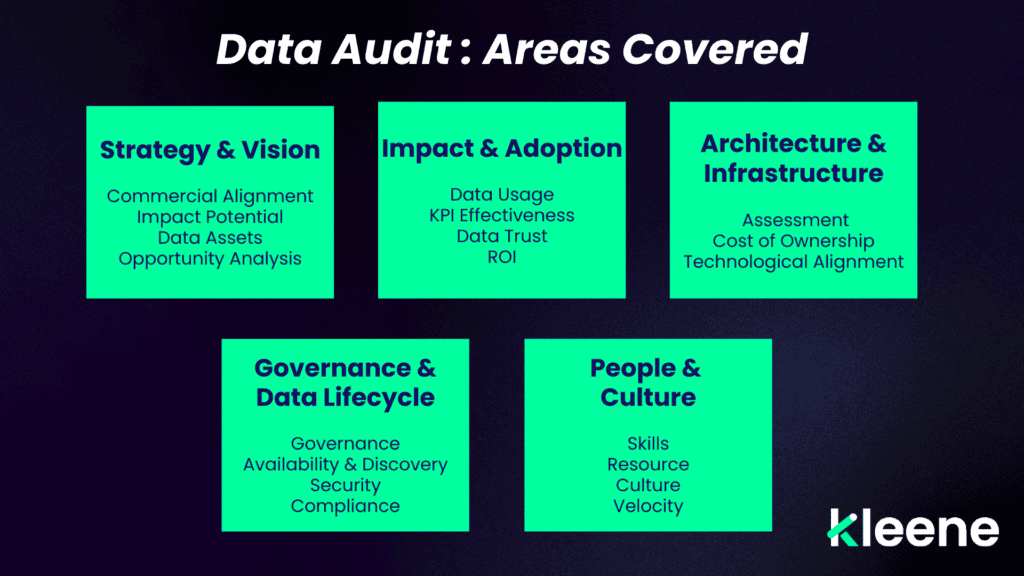Data audits are a common topic of discussion, yet their value isn’t always immediately clear.
Based on research from McKinsey & Company, data-savvy retailers are 23 times more likely to be champions in customer acquisition and 19 times more likely to maintain profitability.
If you’re a data leader, whether a Head of Data, CFO, or CTO, understanding the tangible benefits and scope of a data audit is key. This document highlights the advantages and outlines what a data audit entails to help your organisation make a confident decision.
The Key Benefits of a Data Audit
1. Unlock the Value of Your Existing Data
Underutilised data can undermine the effectiveness and reliability of BI reporting and hinder the strategic insights needed to drive business growth. A data audit can help by identifying:
- Gaps where new data could enhance insights.
- Opportunities to align data with strategic goals.
- Ways to use data for innovation and growth.

“Using Kleene we were able to reduce return rate by 31.5%, accelerate our reporting cycle and hugely improve our data accuracy”.
Rachel Ha, Finance Director at Swoon
2. Opportunities for Cost Reduction
Excessive storage and unoptimised processes can inflate costs.
For example: at Huel, manual processes led to over £100k in annual costs due to extensive engineering resources, reconciliation efforts, and management oversight. The lengthy process impeded finance stakeholders from obtaining timely insights, slowing down business-critical decisions that relied on up-to-date financial data.
A data audit identifies inefficiencies to:
Highlight redundant or unnecessary data.
- Optimise storage usage.
- Streamline operational workflows for greater efficiency.
This means less time wasted on manual reconciliations and more focus on strategic growth.
3. Elevate Your Data Confidence
Poor-quality data leads to flawed analytics and misguided decisions. A data audit provides a clear picture of your data’s reliability by:
- Restoring trust in the insights derived from your data.
- Identifying inaccuracies, redundancies, and inconsistencies.
- Recommending actionable steps to standardise and validate data.
By ensuring accuracy and consistency, you’ll empower your team to make better decisions with confidence.
4. Improve Decision-Making
Decision-makers rely on accurate data. A data audit ensures that:
- Insights are timely, accurate, and actionable.
- Leaders can respond quickly to market changes.
- Resources are allocated based on the most reliable information.
When decision-making is grounded in clean, actionable data, organisations can pivot confidently to seize new opportunities.
5. Break Down Data Silos
Disjointed data hinders collaboration and creates inefficiencies. A data audit fosters integration by:
- Identifying isolated datasets.
- Recommending strategies for cross-departmental collaboration.
- Establishing a unified source of truth.
Collaboration across teams becomes seamless, enabling faster, more effective execution of business strategies.

“Kleene helped us to connect all the essential sources and shape a holistic view of our business. This enables us to create insights that support our decision-making quickly”
– Nicolaj Foldager , CFO at Trendhim
6. Future-Proof Your Data Strategy for AI Implementation
Technology evolves rapidly, and so do data needs. Regular audits help:
- Anticipate emerging trends and adapt accordingly.
- Build resilience into your data management processes.
- Maintain a competitive advantage.
When is a Good Time to Run a Data Audit?
If you’re questioning the value you’re getting from your data, or spending significant time troubleshooting issues without understanding the root cause, it might be time to consider a data audit.
Here are some key challenges that indicate the need for a data audit:
Too slow:
- Building infrastructure takes too long.
- Insights are delayed, impacting decision-making.
- Delivering meaningful impact feels out of reach.
Too expensive:
- Systems and processes are cost-prohibitive.
- Specialist roles and excessive manual work drain resources.
Data trust issues:
- Inconsistent metrics undermine confidence.
- Reporting failures or mismatches between systems create confusion.
Lack of stakeholder buy-in:
- Key decision-makers struggle to trust or align with data initiatives.
- Data strategies are not aligned with business priorities.
No ROI:
- Uncertainty on how to measure value from data projects.
- Difficulty in justifying costs and outcomes.
Not transformational:
- Struggling to deliver the innovation and strategic insights promised.
If any of these challenges resonate, a data audit can help you identify inefficiencies, restore trust in your data, and create a roadmap to maximise its potential.
What Does a Data Audit Actually Include?

If your organisation is grappling with data challenges, a data audit offers clarity and solutions. The audit’s actionable insights enable better compliance, efficiency, and decision-making, making it a crucial step for organisations aiming to maximise their data potential.
1. Architecture & Infrastructure
- Evaluates the systems, tools, and architecture supporting your data.
- Identifies bottlenecks, redundancies, and scalability challenges.
2. Governance & Data Lifecycle
- Assesses data ownership, policies, and accountability.
- Reviews the management of data from creation to deletion.
3. Data Strategy & Vision
- Aligns data initiatives with broader business goals.
- Identifies gaps in data planning and execution.
4. Impact & Adoption
- Measures the usage and effectiveness of data across teams.
- Identifies opportunities for greater impact and cross-functional collaboration.
5. People & Culture
- Examines stakeholder engagement and data literacy.
- Recommends ways to build a data-driven culture.

“The fragmented nature of our data systems made it difficult to have a clear, unified view of critical aspects such as customer behaviour, supply chain logistics, and market trends”.
– Hazel Finlayson, Head of Data at Bella and Duke
Recommendations and Roadmap
The final output of a data audit includes:
- Key findings and identified risks.
- Areas for immediate improvement.
- A prioritised roadmap for ongoing optimisation.
Why Now is the Right Time for a Data Audit
If your organisation is grappling with data challenges, a data audit offers clarity and solutions. The audit’s actionable insights enable better compliance, efficiency, and decision-making, making it a crucial step for organisations aiming to maximise their data potential.
Tailored for Data Leaders
Whether you’re managing a large team as Head of Data or overseeing data strategy as a CFO or CTO, a data audit is essential for effective leadership. It provides the insights you need to:
- Prepare your data for scalability.
- Decrease inefficiencies caused by data fragmentation.
- Learn how to access actionable insights from raw data.
- Overcome budget limitations and limited in-house technical expertise.
- Deliver measurable ROI through optimised processes.
Ready to transform your data strategy? Let’s start with a data audit. Get in touch with Kleene to talk to an expert and book your data audit.



